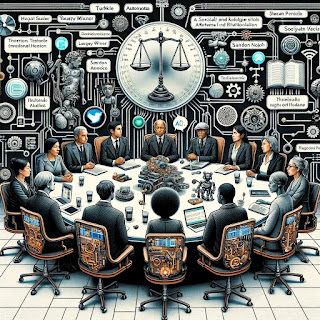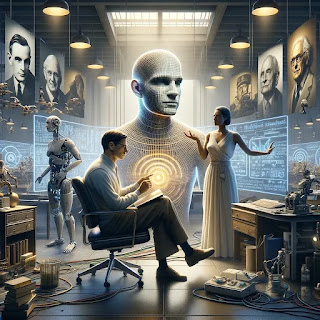Navigating Together: The Human Journey with Automata Theory and AI, Through the Eyes of Critics and Sociologists
As we traverse the evolving landscape of Automata Theory and Artificial Intelligence (AI), it's essential to acknowledge the critical voices and sociological perspectives that have contributed to our understanding of technology's impact on society. These individuals offer insights into the ethical, social, and cultural implications of AI, enriching the narrative with diverse viewpoints.
Sherry Turkle: Reflecting on Technology and Human Relationships Sherry Turkle, an esteemed sociologist and psychologist, has been a leading critic of technology's impact on human relationships. Since the late 20th century, her work has explored how digital devices and AI influence our interactions and sense of self. Turkle's critical insights, particularly highlighted in her book "Alone Together" (2011), challenge us to consider the emotional and social costs of increasingly mediated lives.
Langdon Winner: Questioning Technology's Political Power Langdon Winner, a political theorist, has critically examined the inherent politics of technological designs. His work in the late 20th and early 21st centuries argues that technology is not neutral but embodies specific forms of power and authority. Winner's perspectives encourage us to think about who benefits from AI advancements and who may be marginalized by these technologies.
Yuval Noah Harari: A Historian's View on AI and Society Yuval Noah Harari, a renowned historian, has offered a broad historical perspective on AI's role in shaping human societies. Through his writings, notably "Homo Deus" (2015), Harari discusses the potential futures enabled by AI, including the challenges of algorithmic determinism and the loss of human agency. His work prompts critical reflection on the long-term implications of AI for humanity.
(This image represents the nuanced dialogue around Automata Theory and AI, seen through the critical lenses of Sherry Turkle, Langdon Winner, Yuval Noah Harari, and Safiya Umoja Noble.)
Safiya Umoja Noble: Highlighting Bias in Digital Platforms Safiya Umoja Noble, a scholar in information studies, has brought attention to the biases embedded within digital platforms and AI systems. Her seminal work, "Algorithms of Oppression" (2018), exposes how search engines and AI can reinforce racial and gender stereotypes, advocating for more equitable and ethical approaches to technology development.
Conclusion: A Tapestry of Voices The journey of Automata Theory and AI, enriched by the contributions of critics, sociologists, and historians, is a tapestry woven from diverse threads of thought and inquiry. These voices remind us that the future of AI is not just a technical challenge but a societal endeavor that requires careful consideration of ethical, social, and cultural dimensions. As we move forward, the insights from these scholars and critics will be crucial in guiding the development of AI in a manner that respects human dignity, promotes social justice, and enriches the human experience.



